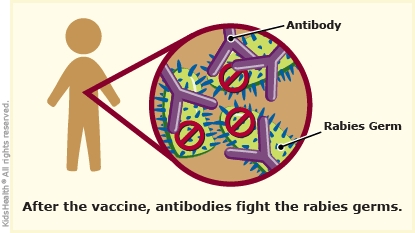Rabies is a rare but serious disease caused by a virus that usually spreads through a bite or scratch from an infected animal. A rabies infection that isn't treated before symptoms start almost always leads to death. Rabies shots are very good at preventing rabies in people who are exposed to the virus.
Your child started their treatment to prevent rabies. First, the health care provider cleaned the wound well. Then, your child got two shots: the rabies immune globulin (to fight the rabies virus right away) and the rabies vaccine (which causes the body to form antibodies to fight the rabies virus). Your child will need three more doses of the rabies vaccine over the next two weeks.



Your child:

It is extremely rare, but someone can have an allergic reaction to the shot. Call 911 right away if your child has any signs of a serious allergic reaction. These can include swelling of the face or mouth, hoarseness, wheezing, trouble breathing, hives, paleness, weakness, dizziness, vomiting, or a fast heartbeat.

How do people get rabies? The virus most often spreads through bites from an infected animal. But it can also spread if the animal's saliva (spit) gets directly into a person's eyes, nose, mouth, or an open wound (such as a scratch or a scrape).
What can help prevent rabies? It's important to: